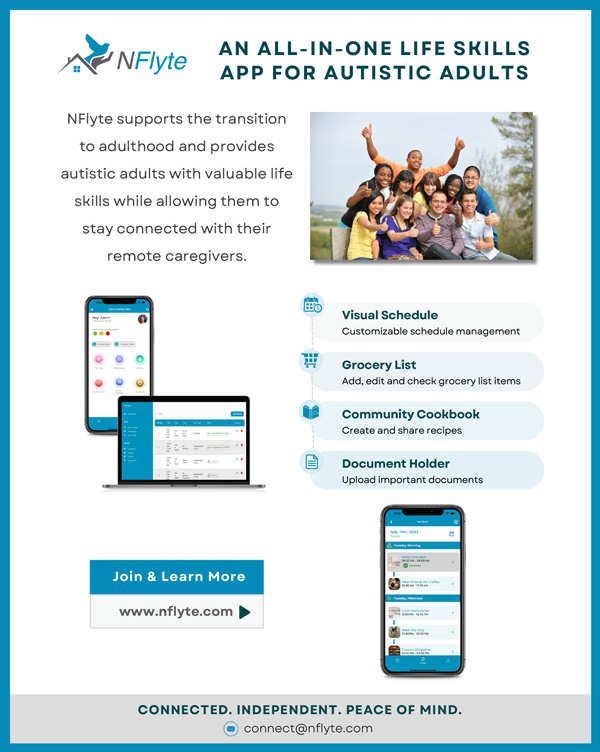At the beginning of the COVID pandemic, a friend came down with a particularly bad case of the virus which required emergency transport to the hospital. Laying on the gurney in the back of the ambulance she panicked as they placed the oxygen mask over her face. The EMS workers were frustrated with her as she continued to rip the mask off because she needed to talk to her sister who was accompanying her in that ambulance. She had so many things that she needed to tell her sister. As a mother and sole caretaker to an adult child with autism, she was frantically listing all the care instructions necessary for supporting her son. That was the only thing on her mind at that moment. She was facing the possibility of her worst fear coming true sooner than expected, “What will happen to him when I’m gone?” She made a miraculous recovery and has become an active advocate for autistic adults.

Once our children reach 22 years of age, they encounter the next era of challenges that comes with the “services cliff” which denotes the end of school-based services. Parents think of what it would look like for their children to live independently, and they start the process of researching the options. Sadly, they are faced with the grim reality that resources are limited and the process for applying for assistance programs can be confusing. For many adults with I/DD there are limited options to obtain employment or increase their earning potential. If approved for SSI, the maximum federal payout is $914/month1 which puts individuals at 25% below the federal poverty level (FPL).2 Waitlists for Medicaid home-and community-based services (HCBS) can reach up to 10 years or more in some states and that funding covers services, not assistance with the cost of housing.3 Where I live in the Charleston, SC area, the fair market value for a one-bedroom apartment is $1,357/month which is not attainable to an SSI recipient who would need rent to be no more than $274/month.4 This example represents what most are experiencing across the country. The result is that 75% of I/DD adults continue to live at home with family.5
The number of autistic students leaving high school has been estimated to reach up to 1 million over the next decade.6 With the most recent increase in childhood diagnosis cases climbing to 1 in 36,7 the number of autistic students transitioning to adulthood will only increase. The phrase often heard from parents is “I just need to live forever,” accompanied by a chuckle underpinned by hopelessness and fear. In truth, the clock is ticking as caretakers are aging themselves and the question of how long they can continue to care for their child looms. Nationwide, half of caregivers to I/DD adults are older than 50, and 10% are 75 or older.8 An added variable is that adults aged 50 years and older often find themselves with increased caretaking responsibilities for aging parents. Therefore, there is a rising population of people sandwiched between caring for their autistic adult child and their aging parents. The pressure on caretakers is profound.
Fortunately, there are efforts, often led by passionate parents, to pave the way for sustainable person-center communities and tools for supported independence. Just as senior living communities have evolved over time, there is progress away from the institutionalized model of the past to create modern communities that are built to support the continued development of practical life, social, and vocational skills. In addition, there is increasing focus on the need for innovators in technology to create tools supporting people with disabilities. Previously, entrepreneurs have faced difficulty in accessing funding for developing solutions in the disabilities market, but organizations such as Multiple Hub and The Disability Opportunity Fund are supporting efforts to make innovation possible.
Modern Housing Options
An excellent source for housing options is provided by The Autism Housing Network and includes a directory of innovative supportive living communities such as these:
Oak Tree Farm is an interdependent affordable housing community in Conway, SC for I/DD adults. The community is comprised of 2- and 3-bedroom townhouses or apartments and includes access to transportation, life skills training, an amenities center, a swimming pool, and on-site laundry facilities. While Oak Tree Farm does not provide direct one-on-one care, there are on-site staff members to do daily check-ins and organize group activities and social events. The rent is approximately $500/month, and the community assists residents with filing for a housing voucher which can cover up to 70% of the cost. Oak Tree Farm will begin moving in the first 75 residents in November 2023 and plans to add an additional building for residents with higher support needs.
First Place Arizona is a 63-apartment complex in Phoenix, AZ for I/DD adults who are transitioning to a more independent life. Each resident lives in their own 1- or 2-bedroom apartment and has access to a full suite of services including group life skills training, daily social activities, vocational assistance, and direct one-on-one practical life coaching. The complex includes a training kitchen where hands-on cooking lessons are offered which not only teaches valuable skills but brings the community together. First Place offers a comprehensive activity schedule so that residents can be as active as they want to engage physically and socially. In addition, they offer a 2-year Transition Academy which is a separate training program for residents that need a more structured transition.
Technology for Independent Living
Technology can play a big part in empowering independence through mobile apps and smart home integrations. To date, most tools available have been designed for K-12 autistic children but that is changing. There are more options coming available to empower autistic adults to live more independently while keeping them connected with their families.
NFlyte is an all-in-one life skills app for autistic adults who need support living independently that allows families, caregivers, and support programs to provide remote help. Independent adults use the mobile app to create customized visual schedules, keep track of shopping lists, create and share recipes with the NFlyte community, and store documents. Parents and programs log into a web-based dashboard to add tasks remotely and see how their adult child is progressing through the day.
Simply Home partners with residents with disabilities to create person-center solutions that integrate with your home to allow greater independence and confidence. The company will outfit a home for a resident with limited mobility to make it easier to operate lights and locks. They can equip homes with a bed, stove, and motion sensors in addition to panic pendants that alert a caretaker in case of an emergency.
Google Home / Amazon Alexa can integrate with a calendar to audibly alert a resident about reminders for daily tasks or can keep track of shopping lists. Parents can remotely add alerts and check integrated lighting and alarms systems.
Autism is for Adults
Many people don’t realize that autism is not solely a childhood challenge. Creating public visibility into autism in childhood has resulted in improvements with early diagnosis. Now we are in a critical need to raise awareness that most individuals with autism are adults and need continued support for the challenges that they face. According to the CDC in 2020, there were approximately 5.5 million autistic adults in the U.S., representing 80% of the total autism population.9 Autism needs a publicity make-over to highlight that there are immediate needs for funding, innovation, and collaboration to meet the unique needs of autistic adults who want and deserve to have the opportunity to live purposeful and independent lives.
Stacey Ledbetter is the mother of an autistic young adult and founder of NFlyte. Motivated to find tools to empower her daughter to live her most independent life, she founded NFlyte which is an all-in-one practical life skills platform for autistic adults with support needs. She serves on a committee at SOS Care/Village Vision in Charleston, SC whose mission is to create affordable housing for I/DD adults.
For more information about Nflyte, visit nflyte.com or email the author at stacey.ledbetter@nflyte.com.
Citations
- 2023, ssa.gov, https://www.ssa.gov/redbook/newfor2023.htm
- 2023, https://www.healthcare.gov/glossary/federal-poverty-level-fpl/
- PBS, The Wait Government Disability Services Can Last Years. Some States are Trying to Change That, (2023), https://www.pbs.org/newshour/nation/the-wait-for-government-disability-services-can-last-years-some-states-are-trying-to-change-that
- National Low Income Housing Coalition, https://nlihc.org/oor/state/sc
- The ARC and The Counsel on Quality and Leadership, There’s No Place Like Home: A National Study of How People with Intellectual and/or Developmental Disabilities and Their Families Choose Where to Live, https://futureplanning.thearc.org/assets/CFP_Housing_Survey_Technical_Report-80e6eb718c816d07a15a9972df06a6e73b1393d5b56ae145acc058fce243cd93.pdf
- Autism Speaks, https://www.autismspeaks.org/autism-statistics-asd
- 2023, CDC, https://www.cdc.gov/ncbddd/autism/data.html
- Grantmakers in Aging, Older Care Givers of People with Intellectual and Developmental Disabilities,(2022), https://helperssf.org/what-happens-to-disabled-adults-with-no-family/
- CDC, (2022), https://www.cdc.gov/ncbddd/autism/features/adults-living-with-autism-spectrum-disorder.html





